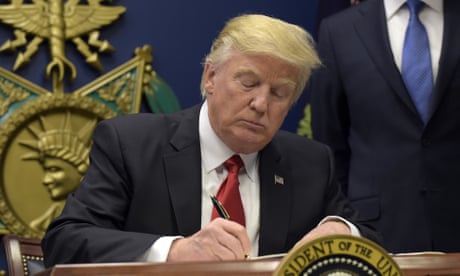
President Trump signs an executive order calling for extreme
vetting of migrants from 7 mainly Muslim countries on 27 January
Hastily drafted and badly executed, President Trump’s discriminatory and unfair visa bans announced on Friday may nevertheless to do more to promote action to contain Jihadi terrorism than his predecessor’s bombs.
Governments across the world may protest, but many are being quietly pressed to align themselves with America’s new chief executive by their own middle classes who fear few things more than being denied the chance to study, live and work in the US.
This explains why the storm of protest in the US and other Western countries about the ban has found little echo in countries it affects now and ones that it could affect in the future.
Iran’s announced a block on visas for American visitors, but it’s got little to lose. Iraq quickly dismissed suggestions it’d would do the same.
Today, UAE Foreign Minister Sheikh Abdullah Bin Zayed said the ban wasn’t anti-Islamic and within the rights of any sovereign nation. In an interview with the BBC, also earlier today, Saudi Energy Minister Khalid al-Falih said more or less the same thing.
Both Saudi Arabia and the UAE are close US allies. ExxonMobil, whose former CEO is now President Trump’s secretary of state, is probably the largest foreign investor in the two countries.
But they are also acutely aware that this is not the time to challenge the new administration or the right issue to confront it about.
Saudi Arabia and the UAE, like all GCC states, have their own highly restrictive immigration policies and want to stay in Trump’s good books.
For Riyadh, the key issue is persuading Trump against fulfilling his campaign promise to move the US embassy from Tel Aviv to Jerusalem in breach of US pledges not to preempt a final settlement between Israel, the Palestinians and Arab states.
Its warm response to Trump’s election and early commitment to the US oil and gas industry appears to be paying off. Trump’s avoiding saying anything about the matter.
The visa ban has horribly affected hundreds of people travelling to the US and raised serious questions in the minds of hundreds of thousands of others, most of them US residents, about the future.
The temporary total ban on refugee arrivals is cold-hearted.
But the ruthless calculation that secured the White House for Trump appears to be working again. Early opinion tests show that most Americans like the ban.
Trump won in November by promising to be a different kind of president; one that keeps promises made during the campaign. Immigration control was one of his key pledges.
So it’s unlikely there’ll be any climb-down. In fact, White House officials suggest the duration of the ban may be extended and that other countries could be added to the list.
This will have a sobering effect on many in developing countries where anti-American sentiment is often expressed but the US is favoured by those that can afford to travel and send family members overseas for education.
They would be wise to temper their language when talking about President Trump’s policies and adjust their actions to match.
American presidents have enormous power. This one’s got objectives and lots of domestic support.
And if you didn’t know that before 20 January, you certainly do now.